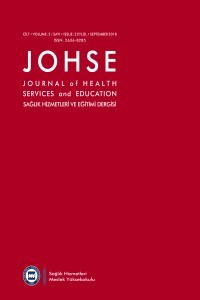Sağlık Hizmetleri Meslek Yüksekokulu Öğrencilerinin Uygulamalı Derslere İlişkin Görüşleri
Bu araştırmanın amacı; Sağlık Hizmetleri Meslek Yüksekokulu(SHMYO) öğrencilerinin uygulamalı derslere ilişkin görüş vedüşüncelerini betimlemektir. Araştırmanın evrenini 2017-18 eğitimöğretim yılı bahar döneminde bir vakıf üniversitesinin SHMYO’nadevam eden ikinci sınıf öğrencileri (N=67) oluşturmaktadır.Örneklem ilgili evrenden kolaylıkla bulabileni örnekleme yöntemikullanılarak iki program olarak belirlenmiştir. Örneklemi oluşturanöğrencilerin % 70’i (n=47) kadın, % 30’u (n=20) erkektir.Araştırmada veri toplama aracı olarak araştırmacı tarafındangeliştirilen Kişisel Bilgi Formu (KBF) ve Öğrenci GörüşAnketi (ÖGA) kullanılmıştır. KBF yedi, ÖGA ise 13 sorudanoluşmaktadır. Araştırma sonuçlarına göre öğrencilerin eğitimgördükleri programı tercih etme nedenleri ve uygulamalı derslereilişkin görüşlerinin farklılaştığı bulunmuştur. Örneğin öğrencilerin% 36’sı “sevdiği için”, % 28’i “kısa sürede iş sahibi olabilmekiçin”, % 15’i de “sınav sisteminden dolayı” şuan eğitim gördükleriprogramı tercih etmiş etmişlerdir. Öğrencilerin % 66’sı “uygulamaöncesinde uygulamanın tecrübe kazandıracağını” düşünürken,uygulamanın sonrasında öğrencilerin % 43’ünün bu düşüncesideğişmiş ve uygulamanın olumlu katkısı olduğunu düşünenlerinoranı % 52 olarak bulunmuştur. Bu sonuç, uygulamalardaöğrencilerin beklentilerinin tam anlamıyla karşılanamadığışeklinde yorumlanabilir. Uygulamalı dersleri daha etkin halegetirmek için sizce nasıl bir yöntem kullanılmalıdır? sorusunaöğrencilerin % 51’i “teknik donanım vb. daha iyi olmalı” derken;yalnızca % 16’sı “mevcut sistemin iyi olduğunu” belirtmişlerdir.Elde edilen bulgular, literatüre dayalı olarak tartışılmış veönerilerde bulunulmuştur.
Anahtar Kelimeler:
SHMYO öğrencileri, öğrenci görüşü, uygulamalı ders
Health Services Vocational School Students’ Opinions About Applied Courses
The purpose of this research is to describe the opinions andthoughts of students at the Health Services Vocational Schoolrelated to applied courses. The sample was determined as twoprograms using the convenience sampling method in the relevantphase. Participants were 67 associate degree program students at aprivate university, 70 % male, 30 % female.Personal İnformation Form and Student Opinion Survey were usedas data collection tool. Results of the research, the reasons whystudents choose the program they are studying and their opinionsabout practical courses differ. For example students say they preferthe program because they like 36 % of the students, 28 % preferthe program to be a short-term business owner and 15 % preferthe program because of the examination system. 66 % of thestudents thought that the practice would gain experience before thepractice, while the proportion of those who thought that 43 % ofthe students thought that this thought had changed and contributedto the practice was found to be 52 %. This result can be interpretedas the fact that the expectations of the students cannot be fully metin practice. In order to make practical lessons more effective, whatkind of method should be applied to you? 51 % of the students saythat they should be good at technical equipment etc.; only 16 % ofthe students say that the current system is good.The findings were discussed and suggested based on the literature.
___
- 1. Gökdoğan O, Sarıgöz, O. Meslek yüksekokulu öğrencilerinin ‘mesleki uygulama dersi’ ile ilgili görüşlerinin değerlendirilmesi. Batman Üniversitesi Yaşam Bilimleri Dergisi, 1 (1), 1091-1100, 2012. Retrieved from http://dergipark.gov.tr/buyasambid/issue/ 29824/ 320956
- 2. Binici H.,Arı N. Mesleki ve teknik eğitimde arayışlar, Gazi Üniversitesi, Gazi Eğitim Fakültesi Dergisi, 2004; 24(3):383-396.
- 3. T.C. Resmi Gazete, Mesleki teknik eğitim bölgesi içindeki meslek yüksekokulu öğrencilerinin işyerlerindeki eğitim, uygulama ve stajlarına ilişkin esas ve usuller hakkında yönetmelik, 22 Mayıs 2002 Tarih ve 24762 Sayılı Resmi Gazete.
- 4. Gümral N.,Coşar ,F. Ebelik ve hemşirelik son sınıf öğrencilerinin okul-hastane işbirliği ile ilgili görüşlerinin değerlendirilmesi, Süleyman Demirel Üniversitesi Tıp Fakültesi Dergisi, 2006; 13(3):21-24
- 5. Friedman T.L. Geciktiğin için teşekkür ederim: Çılgıncasına hızlı bir çağda ayakta kalma rehberi. (Ed. Gülşen Heper; Çeviren: Zafer Akın). İstanbul: Boyner Yayınları, 2018.
- 6. Karasar N. (2015). Bilimsel araştırma yöntemi. Ankara: Nobel Akademik Yayınları,2015.
- 7. Erkuş A. Davranış bilimleri için bilimsel araştırma süreci. Ankara: Seçkin, 2011.
- 8. Fraenkel J. R. & Wallen, N. E. How to design and evaluate research in education. New York:McGraw-Hill Higher Education, 2009.
- 9. Christensen L.B., Johnson, R. B. ve Turner, L. A. Araştırma Yöntemleri: Desen ve Analiz. (Çeviri Ed.: Ahmet AYPAY). Ankara: Anı Yayıncılık, 2015.
- 10. Eraslan A. İlköğretim matematik öğretmen adaylarının ‘Öğretmenlik Uygulaması’ üzerine görüşleri. Necati Bey Eğitim Fakültesi Elektronik Fen ve Matematik Eğitimi Dergisi 2009; 3(1), 207-221.
- 11. Hançer Aydemir D. The Views of Vocational High School Students on Summer Internship:TheExample of Health Services. Türk Yaşam Bilimleri Dergisi, 2016; 1 (1), 34- 42. Retrieved fromhttp://HYPERLINK”http://dergipark.gov.tr/tjls/issue/24143/256231” dergipark.gov.tr /tjls /issue/24143/256231
- 12. Tuygar Ş. F. Paramedik programı öğrencilerinin yaz stajı hakkındaki görüşlerinin incelenmesi. Düzce Üniversitesi Sağlık Bilimleri Enstitüsü Dergisi, 2016; 6 (2), 92-100. Retrieved from http://HYPERLINK”http://dergipark.gov.tr/duzcesbed/issue/24384/258500” dergipark.gov.tr/duzcesbed/issue/24384/258500
- Başlangıç: 2017
- Yayıncı: Marmara Üniversitesi
Sayıdaki Diğer Makaleler
Kromatografiye Giriş, Yüksek Performanslı Sıvı Kromatografi Kullanımında Basit İpuçları
Burcu ESER, Aylin SEPICI DINÇEL
Nitel Araştırma Yöntemlerinden İz Sürme (Tracer) ve Kan Transfüzyonu Sürecinde Bir Uygulama Örneği
Ebelik Öğrencilerinin Bilgisayarlı Simülasyon Uygulaması Sonrası Görüşlerinin Değerlendirilmesi
Duygu MURAT ÖZTÜRK, Fatma Deniz SAYINER, Neşe ÇELİK
Gebelikte Bitkisel Ürün Kullanımı
Sağlık Hizmetleri Meslek Yüksekokulu Öğrencilerinin Uygulamalı Derslere İlişkin Görüşleri
